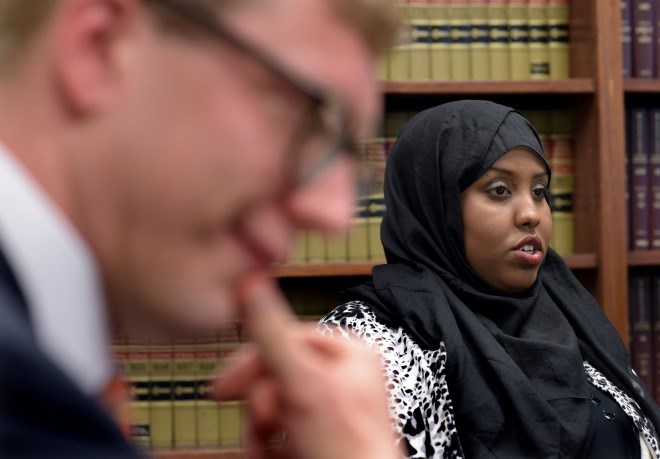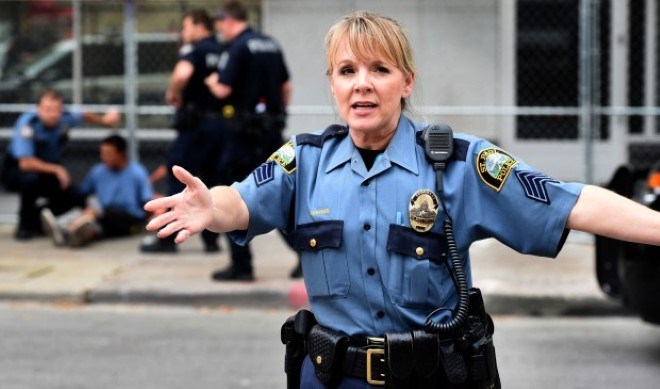
Monday August 23, 2021
By DEANNA WENIGER

Hamdi Ali Osman speaks during an interview in the St. Paul office of her attorney, Andrew Irlbeck, left, on Thursday, April 7, 2016. (Pioneer Press: Scott Takushi)
A St. Paul police officer is at the center of a U.S. Supreme Court petition that seeks to remove immunity protections from federal law enforcement officers who violate a citizen’s constitutional rights.
The petition, brought forward by the Institute for Justice, alleges that Sgt. Heather Weyker, who was an FBI sex-trafficking task force member in 2010, wrongly detained a teen girl in jail for 17 months during a much-publicized investigation.
“Right now, if you live in the heartland of America — from Minnesota to Louisiana and Texas to North Dakota — anyone who carries a federal badge can violate your constitutional rights with absolute impunity,” said Anya Bidwell, an attorney for IJ, a nonprofit nationwide law firm that litigates cases where government policies infringe on an individual’s freedoms. “There is a federal statute that allows state and local officers to be held accountable when they violate someone’s constitutional rights, and the courts have leaned on the fact that there is no analogous law doing the same for federal officers, thereby allowing them to escape accountability.”
A STRONG CASE BUT STILL A LONG SHOT
The earliest the court could decide whether to hear the case is the end of September. The court receives approximately 7,000 to 8,000 petitions each year and grants oral arguments in about 80 cases. The court heard 62 cases in 2020
Hamdi Mohamud, who was 16 at the time, is grown up now, but has never had her day in court. She was not a major player in the sex-trafficking case, but was pulled in because of her association with a key witness. She was charged with tampering with a federal witness and spent a year and a half in jail before the charges were dismissed.
“She’s not even had a chance to take her case to trial and tell the judge and jury about what happened to her,” said Patrick Jaicomo, an IJ attorney. “The courts have said you can’t take this in front of a jury. You’re not allowed to go that far in the process, because (Weyker) is a federal officer. You can’t sue.”
BIG FBI CASE, SHORT ON EVIDENCE
The case in question was announced to the public with great fanfare in 2010. The task force was busting up a multi-state sex-trafficking operation controlled by Somali gangs. There was a 24-count indictment against three women and 26 men and allegations that girls from the Twin Cities, some younger than 13, had been forced into prostitution.
The defendants had colorful nicknames — Shorty, Forehead, Hollywood, Barnie — as did the gangs they supposedly ran with — the Lady Outlaws, the Somali Mafia and the Somali Outlaws.
But the case, which was tried in Nashville, fell apart in court.
The 6th Circuit Court of Appeals summed up the issues: “We conclude from our careful review of the trial transcript and record that, if the prosecution proved any sex trafficking at all (and we have serious doubts that it did), then at best it proved two separate, unrelated, and dissimilar sex-trafficking conspiracies, involving different defendants,” wrote Judges Alice M. Batchelder, Sean F. Cox and Helene N. White.

St. Paul police Sgt. Heather Weyker responds to a call about a “suspicious package” on Wabasha Street in St. Paul on Thursday, Oct. 6, 2016. (Pioneer Press: Jean Pieri)
The defense argued that Weyker “exaggerated or fabricated important aspects of this story,” and “misstated facts in the reports, adding to and omitting things.” The defense said she was caught “lying to the grand jury,” lying “during a detention hearing,” and “endorsing the validity of (a) forged birth certificate.”
A district court judge dismissed charges against three of the men because they had been minors at the time the alleged crimes took place. Nine were tried before a federal jury in 2012. Jurors found six of them not guilty. The three who were charged were acquitted on appeal.
“I was put in jail for 17 months because an officer lied about me,” Mohamud said in a video interview with IJ. “I kept thinking, all this is just a mistake.”
FALLOUT: 22 CIVIL LAWSUITS
Defendants got in line to sue Weyker, filing 22 civil lawsuits. But Weyker, who was deputized as a special deputy U.S. marshal from 2010 to 2014, had immunity and could not be sued. None of the lawsuits thus far have prevailed.
“The courts have turned a federal badge into a shield against the Constitution, and that needs to change,” Jaicomo said. “This absolute immunity for federal police officers makes no sense and violates this country’s founding principle that where there is a right, there must be a remedy.”
After a request for comment on the petition, the St. Paul Police Department responded by saying that an internal-affairs investigation involving Weyker that was started in March 2016 remains open.
HOW WAS HAMDI MOHAMUD INVOLVED?
Mohamud’s involvement in the case is periphery. She was not part of the alleged sex ring. She was not one of the underage girls who was supposedly prostituted. As she put it, she was in the wrong place at the wrong time.
In 2011, she and her friends, unaware of Weyker’s investigation, were attacked by a witness in the case. The girl brandished a knife and smashed the windshield of Mohamud’s friend’s car and hit one of her other friends. The girls called 911. The witness called Weyker.
Wishing to protect her witness, Weyker called the Minneapolis police officer who had responded to the 911 call and told the officer she had information that Mohamud and her friends had been trying to intimidate her witness. The officer, acting on this information, arrested Mohamud and her friends on suspicion of tampering with a federal witness.
Mohamud would be detained for 17 months in an out-of-state prison. Her charges were eventually dismissed.
“She was a 16-year-old Somali refugee, obviously from very modest means,” Jaicomo said. “Her mom and siblings escaped a war-torn Somalia, so they didn’t come with suitcases full of cash. Hamdi was shipped to Tennessee and she never had a single visitor the entire time that she was down there except for her lawyers.”
Should the Supreme Court agree to hear the case, the results could have a significant impact on how federal officers who break the law are treated in court.
“It would be an absolutely game-changing decision that would ensure that any of those officers who violate the United States Constitution can be held accountable,” Jaicomo said. “It would change the accountability regime across the entire United States.”